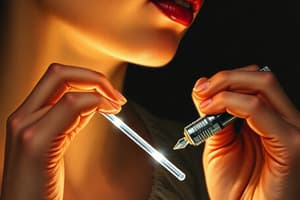Podcast
Questions and Answers
What is the mechanism of action of anesthetic gels on oral mucosa?
What is the mechanism of action of anesthetic gels on oral mucosa?
- Reversibly blocking nerve conduction near their site of administration (correct)
- Diffusing into nerve cells and binding to potassium channels
- Increasing the ionic fluxes required for the initiation and conduction of impulses
- Stimulating nerve endings to produce a sensation of pain
What is the duration of action of benzocaine?
What is the duration of action of benzocaine?
- 10-15 minutes
- Less than 30 seconds
- 30-60 minutes (correct)
- 1-5 minutes
What is the primary site of action of cetacaine?
What is the primary site of action of cetacaine?
- Free nerve endings in the dermis or mucosa
- Ear, nose, mouth, pharynx, larynx, trachea, bronchi, and esophagus (correct)
- Nerve cells in the skin
- Sodium channels in nerve cells
What is the mechanism of action of anesthetic gels on nerve conduction?
What is the mechanism of action of anesthetic gels on nerve conduction?
What is the duration of action of anesthetic gels?
What is the duration of action of anesthetic gels?
What is the mechanism of action of benzocaine on nerve cells?
What is the mechanism of action of benzocaine on nerve cells?
What is the time it takes for benzocaine to take effect?
What is the time it takes for benzocaine to take effect?
What is the primary use of anesthetic gels?
What is the primary use of anesthetic gels?
What is the mechanism of action of cetacaine on nerve conduction?
What is the mechanism of action of cetacaine on nerve conduction?
What is the duration of action of cetacaine?
What is the duration of action of cetacaine?
What is the mechanism of action of Articaine in blocking nerve conduction?
What is the mechanism of action of Articaine in blocking nerve conduction?
What is the effect of Articaine on systemic absorption?
What is the effect of Articaine on systemic absorption?
What is the half-life of Articane?
What is the half-life of Articane?
What is the potency of Centbucridine compared to lignocaine?
What is the potency of Centbucridine compared to lignocaine?
What is the effect of Centbucridine on cardiovascular parameters?
What is the effect of Centbucridine on cardiovascular parameters?
What is the primary site of metabolism for Articaine?
What is the primary site of metabolism for Articaine?
What is the duration of action of Articaine compared to lignocaine?
What is the duration of action of Articaine compared to lignocaine?
What is the effect of Articaine on systemic toxicity?
What is the effect of Articaine on systemic toxicity?
What is the group to which Articaine belongs?
What is the group to which Articaine belongs?
What is the purpose of Xylocaine Spray?
What is the purpose of Xylocaine Spray?
Flashcards are hidden until you start studying
Study Notes
Local Anesthetics
- Articaine is an intermediate-potency, short-acting amide local anesthetic with fast metabolism due to an ester group in its structure.
- Articaine is effective with local infiltration or peripheral nerve block in dentistry.
- It blocks nerve conduction by reversibly binding to the α-subunit of the voltage-gated sodium channels within the nerve.
Properties of Articaine
- Has a vasodilatory effect, increasing systemic absorption, countered by epinephrine 1:60,000, 1:100,000, and 1:200,000.
- Metabolism is mainly in the liver and plasma.
- Elimination is exponential with a half-life of about 20 minutes.
- Has a faster onset of action, longer duration, higher success rate, and greater potency (1.5x more potent) compared to lignocaine.
- Systemic intoxication is lower.
Centbucridine
- Found to be an ideal local anesthetic agent with no effects on cardiovascular parameters and exhibiting sufficient local anesthetic activity.
- Quinoline derivative, 5-8 times more potent than lignocaine.
- Does not affect CNS and CVS adversely.
- Has intrinsic vasoconstricting and antihistaminic properties.
Xylocaine Spray
- Numbs the lining of the mouth, throat, nose, or perineum to reduce pain and gag reflex for examination.
- MOA: inhibits ionic fluxes required for the initiation and conduction of impulses in neuronal membranes.
- Lasts for 10-15 minutes, taking effect within 1-5 minutes.
Anesthetic Gels
- Used on oral mucosa prior to local anesthetic injections, scaling, and prophylaxis.
- Relieves discomfort associated with taking impressions and intra-oral radiographs.
- MOA: reversibly blocks nerve conduction near the site of administration, producing temporary loss of sensation in a limited area.
- Takes effect within 10 minutes, lasting up to 30-60 minutes.
Benzocaine
- Indicated for topical anesthesia in a wide variety of conditions including skin irritation, oral pain, and hemorrhoids.
- MOA: diffuses into nerve cells, binds to sodium channels, preventing channels from opening, and blocking the influx of sodium ions.
- Takes effect within less than 5 minutes, lasting 30-60 minutes.
Cetacaine
- Used to control pain for surgical or endoscopic procedures in the ear, nose, mouth, pharynx, larynx, trachea, bronchi, and esophagus.
- MOA: quick onset in 30 seconds (tetracaine hydrochloride), slow onset for an extended duration of 30 to 60 minutes (butamben).
- Acts by reversibly blocking nerve conduction.
Studying That Suits You
Use AI to generate personalized quizzes and flashcards to suit your learning preferences.




